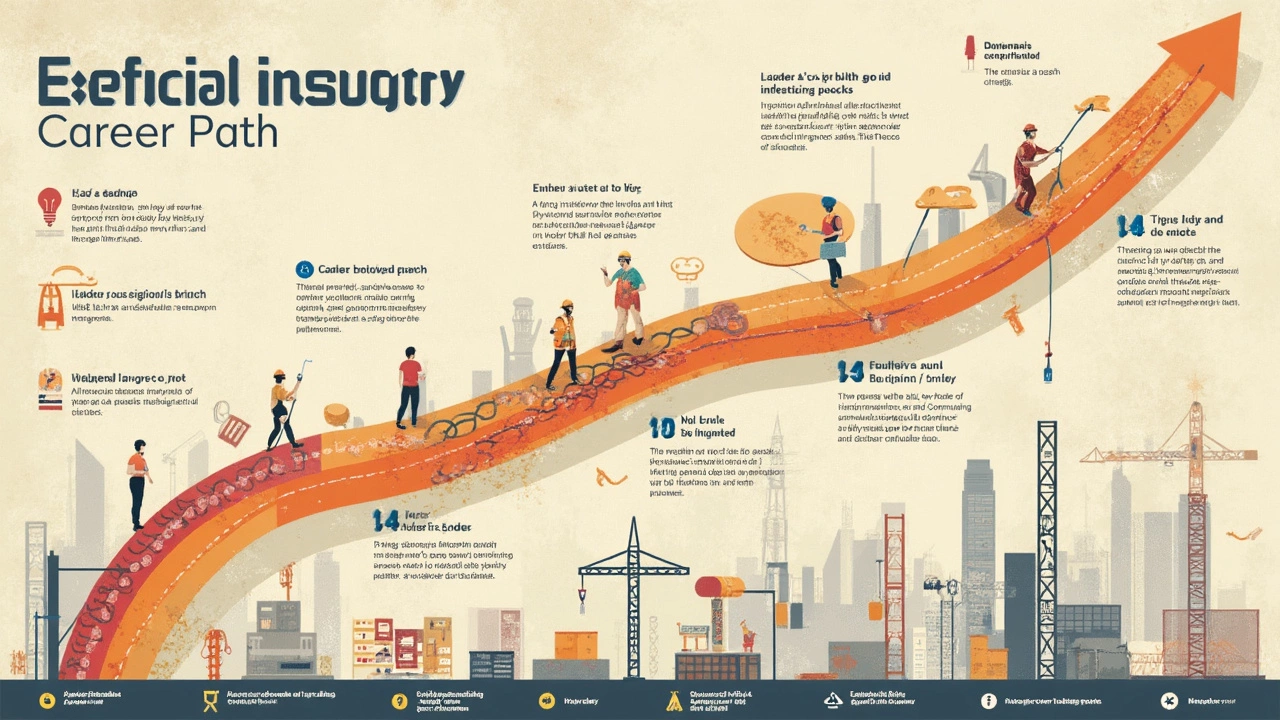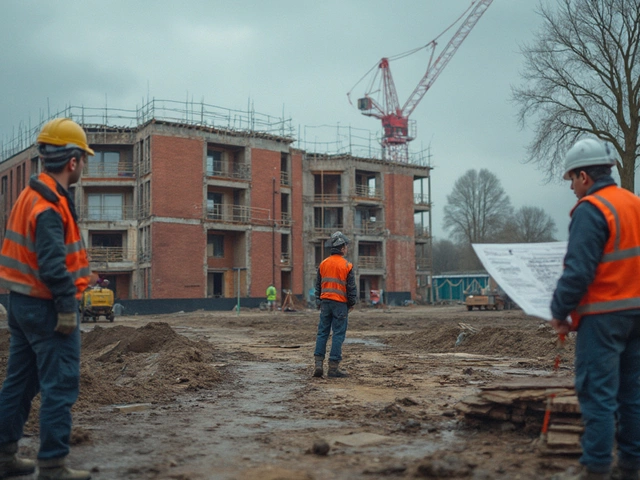Ever catch yourself gazing at those towering cranes working over city skylines and wonder, who in the world earns the most in this gritty world of construction? It’s not as simple as pointing to the strongest guy with a sledgehammer. The construction industry is vast, and so are the earnings for those with the right skills and experience.
Let’s break it down a bit. First off, while most people think of construction workers as guys in hard hats hammering nails, there’s actually a whole bunch of roles that make up this field. And spoiler alert: not all of them involve heavy lifting. Some of the highest paychecks in construction go to folks like crane operators and project managers. Why? Well, they’re the ones handling tons of steel swinging above our heads or keeping multi-million-dollar projects on track.
In reality, several factors skyrocket a construction worker’s pay—think experience, certifications, and sometimes, just plain old grit. For folks aiming to top the pay scale, investing time in acquiring specific skills and certifications can pay off big time. Whether it’s mastering complex machinery or building a reputation for getting things done efficiently, it all adds up. So, if you’re intrigued by the idea of making a lucrative career on a construction site, stick around and let’s see what it takes to cash in big time in this dynamic industry.
- Understanding Construction Worker Salaries
- Top Paying Roles in Construction
- Factors Influencing Salaries
- Skills and Certifications That Boost Pay
- Career Advancements and Opportunities
Understanding Construction Worker Salaries
Alright, let’s dig into what construction worker salaries look like. It’s not just about the hours you put in or how many bricks you lay. In the world of construction, pay can vary a lot depending on your role, location, and skill level.
For starters, different jobs mean different paychecks. Your typical laborer might pocket around $40,000 a year, but if you're operating giant machinery like cranes, you’re likely looking at much more—upwards of $70,000 or even more annually. The big bucks? Those often go to the folks in charge, like project managers, who can earn over $100,000.
Location is a biggie too. Take Vancouver, for example. The cost of living is not exactly cheap and salaries often reflect that. A construction worker in Vancouver usually earns more than someone doing the same job in a smaller town.
| Role | Average Salary |
|---|---|
| Laborer | $40,000 |
| Crane Operator | $70,000 |
| Project Manager | $100,000+ |
Then there’s the experience factor. With more years under your belt, pay tends to increase. But it’s not just about years on the job; it's also about the skills you bring to the table. Having specialized skills or certifications can bump up your pay significantly. Just think about the demand for top-notch electricians or welders.
In short, a construction worker salary is like a puzzle with lots of pieces. The more pieces you’ve got—whether it’s specialized skills, years of experience, or even just living in a high-demand area—the more that paycheck can grow. So, if you’re dreaming of fat paychecks in construction, it’s all about stacking up the right credentials and experience.
Top Paying Roles in Construction
When you think about the highest salaries in the construction industry, crane operators and project managers often come out on top. But what makes these roles command such a hefty paycheck?
Crane operators have one of the most crucial jobs on any construction site. They aren't just moving weights as if playing a giant game of Jenga; they're moving tons of steel and materials with precision and skill. Depending on the location and project, these pros can earn anywhere from $60,000 to over $100,000 annually. It’s a high-stakes job, which is why it comes with a big paycheck.
Then, there are project managers. These folks are like the directors of a blockbuster movie, making sure every piece of the construction puzzle fits just right. They plan, budget, oversee, and lead the project. With the weight of the entire project on their shoulders, their salaries match the load, often ranging from $70,000 to $150,000, or even more with experience and specialization.
But wait, there’s more. Electricians and plumbers specializing in the construction of large structures or high-rise buildings can also rake in substantial earnings. Depending on their expertise and location, their salaries can range greatly, often surpassing $80,000 annually.
- Electricians: Vital for wiring and electricity needs, especially in commercial and industrial projects.
- Plumbers: Essential for installing and maintaining systems used for water, sewage, and drainage.
- Pipefitters and Steamfitters: They work with high-pressure systems and can earn significant wages, particularly in industrial sectors.
- Construction Managers: Oversee construction projects and ensure they run smoothly, a job that requires leadership and technical prowess.
Experience, location, and industry trends can impact these earnings significantly. For those considering a shift or start in these roles, getting the right certifications and experience is the key. Plus, being willing to work in less glamorous or tough environments can sometimes mean a bigger payday!

Factors Influencing Salaries
Have you ever wondered what really drives those juicy construction worker salaries sky-high? It’s kind of like baking a cake; you've got a whole mix of things making it just right. Let’s dig into what makes salaries tick in the construction industry.
First up, experience. Like in any job, if you've been around the block a few times and know the ropes, you're more valuable. Hiring a seasoned pro who’s seen it all costs more, but they’re usually worth every penny because they bring a whole toolbox of practical know-how.
Next is location. It’s a bit of a no-brainer, but if you’re working on a massive skyscraper in New York or Vancouver, you’re likely pulling in more bucks than if you're on a smaller project in a less pricey city. It’s all about the cost of living and the scale of the projects happening around you.
Certifications and special skills also pump up those paychecks. Got a knack for operating tower cranes or maybe a certified expert in plumbing for high-rises? Specialized skills can set you apart, and companies are willing to pay more for that expertise. It’s like having extra credit on your report card.
Construction demand is another biggie. When there's a boom, and everyone's busy pouring concrete or wiring up new buildings, employers compete for skilled workers, raising salaries as a result. It’s simple supply and demand.
And let’s not forget about union membership. In some regions, unions help secure better wages and benefits for their members through collective bargaining. If you’re part of one, you might see that reflected in your paycheck.
With all these factors mingling together, it can be a pretty dynamic scene. Understanding these can not only help you gauge where to position yourself in the industry but also steer your career strategically to land the best opportunities.
Skills and Certifications That Boost Pay
Thinking about leveling up your paycheck in the construction industry? Then you’ve got to talk skills and certifications. In this field, it's not just about showing up with a tool belt. There's serious cash to be made if you play your cards right.
First things first, let's talk machinery skills. Operating big machines like cranes or bulldozers can seriously pad your bank account. Crane operators, for instance, sometimes earn more than folks in those snazzy office gigs. But how do you get there? It’s all about certifications. Get a certificate from a recognized course, and you're a step closer to that top-tier paycheck.
Apart from operating machinery, consider beefing up on specialized skills. Take welding, for example. A certified welder who can handle pressure welding or intricate designs is a gold mine in many construction projects. Plus, welding certs aren’t that hard to snag. With some focused training, you could turn a weekend hobby into a high-paying career.
Certain certifications can really make you stand out. Think about getting licensures like LEED (Leadership in Energy and Environmental Design). It’s a big bonus if you’re working on green buildings. Also, certifications in project management, like PMP (Project Management Professional), are golden, especially if you're aiming for those managerial roles in construction.
Here’s a rundown of some key certifications:
- OSHA Certification – Required for safety and absolutely crucial on your CV.
- NCCER Certification – Offers various paths like electrical or HVAC, boosting entry-level salaries.
- LEED Accreditation – Essential if you want to work on eco-friendly projects.
Let’s not forget about soft skills. Communication, problem-solving, and the knack for staying calm on a crazy site – these matter, and sometimes they’re the deal-breakers between that promotion or staying where you are.
The bottom line? Don't just swing the hammer – think certifications, skills, and a mindset that’s all about learning. That’s how you climb up the pay scale in construction.

Career Advancements and Opportunities
If you ask any seasoned construction worker how to climb the ladder, they’d probably mention two words: skills and reputation. It's no secret that getting ahead in the construction world is all about mastering your trade and showing you can deliver quality work on time. But what really makes a difference is knowing where to focus your efforts.
When it comes to juicy roles with bigger paychecks, becoming a project manager is like hitting the jackpot. These folks are the maestros orchestrating the whole show, ensuring everything runs smoothly and stays on budget. It’s not something you jump into overnight, though. Many project managers start as skilled tradespeople or even construction workers and work their way up through experience and additional training, often snagging a degree or certifications in construction management along the way.
Another top shot position? Crane operators. Now that might sound surprising, but mastering those massive machines can really put you at the top of the pay scale. Crane operators need specific certifications and training, but with the right expertise, this path can be incredibly rewarding.
Trade specializations also open doors to higher salaries. You have welders and electricians who earn quite a bit as their technical skills are always in demand. Attending vocational schools or apprenticeships can make you a sought-after professional. Plus, once you’ve got a few years under your belt, moving into supervision or teaching roles can be a sweet gig too.
And get this—technology is changing the game. If you're tech-savvy, there's room to shine in roles like BIM (Building Information Modeling) specialists or drone operators, which are becoming increasingly important in modern construction projects. These roles can boost your income and keep things exciting as you’re at the forefront of innovation.
| Role | Average Salary (USD) |
|---|---|
| Project Manager | $95,000 |
| Crane Operator | $70,000 |
| Electrician | $60,000 |
So if you're considering leveling up in construction, think about what skills you can add to your toolkit. Maybe it’s a certification or learning how to handle new tech. Whatever you choose, there’s plenty of room to grow—and earn more—if you’re ready to put in the work.








